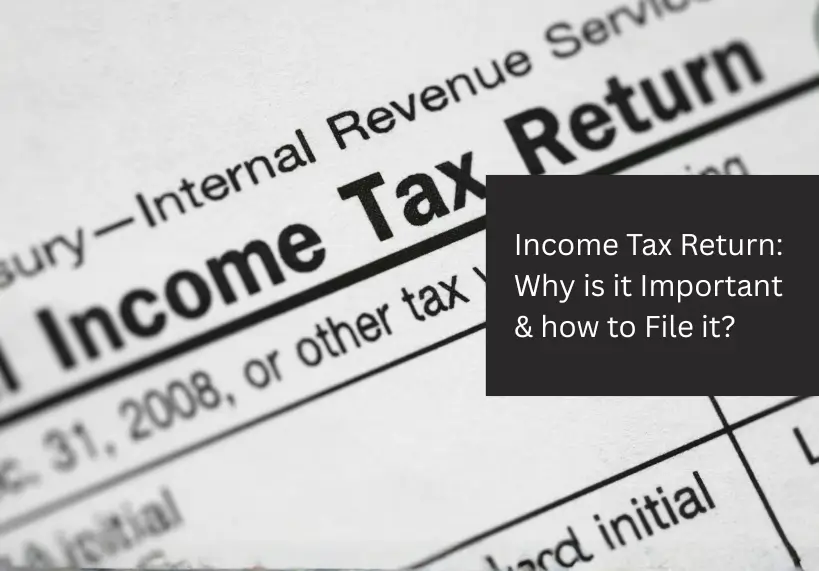
Disclaimer: “This article is for informational purposes only and does not constitute tax, legal, or financial advice. Tax laws and procedures change frequently — consult a qualified tax professional or the official Income Tax Department website before taking action. (Information current as of October 2025.)
Information current as of October 2025. Please verify dates and limits on the official Income Tax e-filing portal before filing”
Many people think filing an ITR is only for high earners, but that’s not true. An Income Tax Return (ITR) is important for everyone whether you’re a salaried employee, freelancer, or business owner.
It helps you claim tax refunds, prove your income, and build a strong financial record, which can make loan approvals easier.
So, what exactly is ITR, and why does it matter so much? More importantly, how can you file it without getting confused by tax jargon? In this guide, we’ll simplify everything you need to know about what ITR is, why it’s important, and how to file it.
What is Income Tax Return?
An Income Tax Return (ITR) is a form you file with the Income Tax Department to report your income, taxes paid, and investments for the year. In simple terms, it’s how you tell the government how much you earned and how much tax you’ve already paid.
If you’ve paid more tax than required, you can even get a refund by filing your ITR on time. You must file an ITR if your total income exceeds the applicable basic exemption limit (which varies by age
Make sure to choose the right ITR form and verify your TDS and deductions (like under Section 80C) before submitting. Due dates for filing ITR are set by the CBDT and may change yearly. For most non-audit individual taxpayers
Importance of Filing ITR
Filing your Income Tax Return (ITR) isn’t just mandatory, it’s a smart financial habit with many benefits.
1. A sign of responsibility
Filing ITR shows you’re financially responsible. Even if your income is below the taxable limit, submitting your return helps avoid penalties and keeps your records clean.
2. Helps secure loans and credit
Banks and lenders often ask for ITRs when approving loans or credit cards. A consistent ITR record proves your income and repayment ability, making approvals easier.
3. Claim adjustments for past losses
Filing ITR lets you carry forward business or capital losses to offset taxes in future years, helping reduce your tax liability.
4. Eligibility for revised returns
Section 139AA requires PAN holders who are eligible for Aadhaar to quote their Aadhaar number while filing. Some exceptions apply (for example certain non-resident categories). Failure to comply within notified timelines may render PAN inoperative — verify current rules on the official portal.
5. Proof of financial stability
ITRs serve as proof of income, useful for loans, property registration, or other financial transactions.
Filing your ITR regularly also helps when applying for personal loans, as lenders require proof of income and tax compliance.
How to File Income Tax Return?
You can file your income tax return through both online and offline methods. Here’s how you can do it:
Online Process to File ITR
- Visit the official Income Tax e-filing portal
- Log in with your PAN and password, or create an account if you don’t have one
- Click ‘e-file’ → ‘File Income Tax Return’
- Select your income category (Individual, HUF, etc.) and the correct ITR form.
- Enter necessary bank and income details; double-check prefilled information
- Submit the form and e-verify using one of the available methods: Aadhaar OTP, Electronic Verification Code (EVC) via a pre-validated bank/demat account, net-banking, or Digital Signature Certificate (DSC).
- Optionally, take a printout for your records
Offline Process to File ITR
- Visit the official Income Tax e-filing portal
- Download the ITR utility software from the ‘Downloads’ page
- Extract the ZIP file and open the software
- Select the correct ITR form and fill in the required details
- Generate the JSON file using the Income-Tax Department’s offline utility, save it, and upload that JSON via your e-filing account (or use the utility’s upload feature), then e-verify the return.
- Double-check all information and calculate your tax
- Log in using your PAN and password, select assessment year and form type
- Choose Original or Revised Return, upload the XML, and verify your ITR
Important Notes for Filing ITR
Include all sources of income, claim deductions, pay any remaining tax, and ensure timely verification to avoid penalties.
What are the Documents Required to File ITR?
Having the necessary documents ready makes the ITR filing process smoother. Here’s a quick list of essential documents:
1. Form 16
Issued by employers to salaried individuals, showing salary details, deductions, and tax liability.
2. Bank & Post Office Interest Certificates
Includes interest earned from savings accounts, fixed deposits, and recurring deposits, which is taxable.
3. Form 16A & Other TDS Certificates
Keep certificates for any TDS deducted on non-salary income (interest, professional fees, rent, etc.). Use these to reconcile tax credit in Form 26AS and avoid mismatches.
4. Annual Information Statement (AIS)
A record of financial transactions, including income and investments.
5. Form 26AS
A tax passbook showing TDS, advance tax payments, and refunds.
6. Investment & Expenditure Proofs
Required for deductions under 80C (PPF, ELSS), 80D (health insurance), and other eligible investments.
7. Capital Gains Statements
If you sold shares, mutual funds, or property, relevant details must be maintained for tax calculation.
8. Foreign Assets & Income Details
Mandatory disclosure of overseas bank accounts, properties, or investments.
9. Aadhaar Number
Compulsory under Section 139AA of the Income-tax Act, 1961.
10. Bank Account Details
List all bank accounts held during the year, including IFSC codes.
11. Other Essential Documents
- PAN Card – Required for tax filing
- Salary Slips – Helps calculate taxable income
- Proof of Tax-Saving Investments – Needed to claim deductions
- Bank Statements – Useful for verifying transactions
Summary
Filing your Income Tax Return (ITR) is an important part of maintaining your financial health. It helps you stay compliant, claim refunds, and create a reliable financial record.
For business owners, a well-maintained ITR can be an essential factor when applying for loans. If you’re considering expanding your business or need working capital, LoanTap offers business loans with simple documentation and flexible eligibility.
Filing your ITR not only keeps you on track with taxes but can also improve your chances of securing the funding you need to grow your business.
Frequently Asked Questions
What is the difference between ITR-1 and ITR-2?
ITR-1 (Sahaj) applies to resident individuals with total income up to ₹50 lakh from salary/pension, one house property and other specified sources — subject to exclusions (e.g., business income, certain capital gains, more than one house property, foreign assets). ITR-2 is for individuals with incomes such as capital gains or other incomes not eligible under ITR-1. Refer to official ITR instructions for exact eligibility.
Can I file an ITR if I don’t have a source of income?
If you don’t have any income or your total income is below the basic exemption limit, you might not need to file an ITR. However, if you have deductions or are eligible for a refund, you can still choose to file.
What is ITR refund?
An ITR refund is the amount you’ve paid in excess of your actual tax liability. Once your ITR is processed, you may receive a refund for any overpayment made.
Can I file ITR for previous years?
Yes, you can file your income tax return (ITR) for previous years under the ‘Belated Return’ option. You can file a belated return before 31 December of the assessment year (or as per the e-filing portal
Can I file ITR for multiple sources of income?
Yes, you can file your ITR if you have income from different sources, such as salary, freelance work, or investments. Just make sure to declare all your income in the correct sections of the ITR form for accurate tax assessment.








